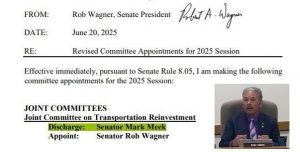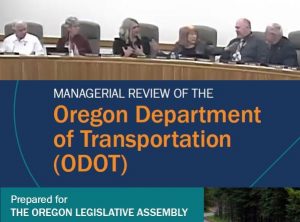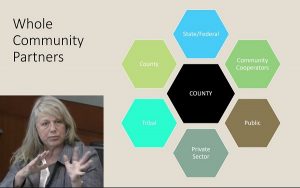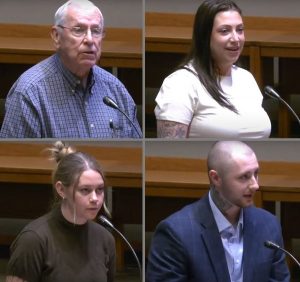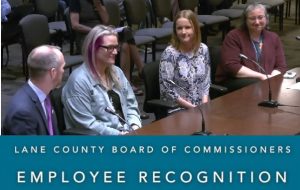Sex workers mark day to end violence Dec. 17
12 min read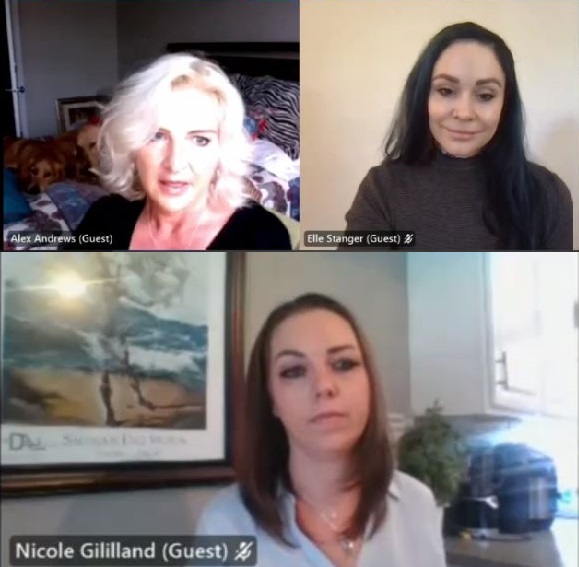
DJ Suss D: There’s an event on Dec. 17 in Portland and across the world to decriminalize sex work. So I have Elle Stanger of the Oregon Sex Workers Committee. Her Strange Bedfellows podcast was named ‘the best sex and politics podcast you’ve never heard of’ by Portland Mercury and earned 100,000 subscribers in two years.
[00:00:23] Elle Stanger (ORSWC): The reason Oregon Sex Workers Committee started was because we need decriminalization of prostitution-related laws and statutes in Oregon. We need it really bad. We need it around the country. We need it around the world. Some places have already decriminalized, like New Zealand or New South Wales. Belgium did it two years ago.
[00:00:47] The reason we need decriminalization is because currently in Oregon, about 90 percent of police anti-trafficking funding is consistently used to create fake ad listings for adults seeking other adults, posing as sex workers. And then when these would-be clients respond to them because they want touch or companionship or excitement or arousal, they are arrested and often labeled in the news media as people who are participating in sex trafficking because it is funded from the anti-trafficking budget.
[00:01:27] But these people were actually just charged with consistently if you look and you read what their charges are if someone is being charged with pandering or solicitation of prostitution and there’s no mention of minors. It means that they’re an adult who thought they were engaging transactionally with another consensual adult.
[00:01:47] A lot of taxpayers would not be okay knowing that the cops use so much money intended to prevent trafficking when actually in the participation of targeting people who are just interacting (although illegally) still, by the consent of other adults, which is not sex trafficking.
[00:02:06] Anytime you try to criminalize most things that are commodified, you create a huge opportunity for underground markets. The easiest parallel is when about 100 years ago, American society and government in opposition to alcoholism and unemployment and domestic violence, they thought that making alcohol production and consumption and distribution of alcohol illegal—
[00:02:32] They thought, ‘Well, we’ll just make booze illegal. You can’t buy it, sell it, or make it. And then all these other problems will go away.’ Turns out that’s not how that works. People who were in perfectly legal, regulated businesses, operating the way that they always should have been: They’re now out of work.
[00:02:49] They’re shuttered, their business, you know, their family is screwed. Are they going to stop making alcohol? Maybe. Or they might make it, you know, bootleg or underground. This also gave rise to the mafia and the mob that could be connected to the police so that certain venues are allowed to produce or sell alcohol, you know, speakeasies, as long as they pay off the cops or the mobs that are running them.
[00:03:13] This is why so often police are actually engaging in the trafficking, or the exploitation of people, because they’re the ones who have access to them, unfettered, under the current model.
[00:03:25] Sex work activism is actually centuries old, and in America, decades old, and was closely linked to the civil rights movement.
[00:03:34] Most of the Black people who were trans or gay or queer in the ‘60s and ‘70s, much like now, who are doing activism work, many of them have friends or family who have had to hustle sex work to survive and are the most likely to be arrested or targeted or visible or marginalized.
[00:03:52] One of the biggest examples and bad players in this that is quite prolific with misinformation, and they’ve now reached over to the mainstream and to leftists themselves because of brilliant marketing, so: NCOSE, National Center on Sexual Exploitation, is what they call themselves. You can look them up. They were founded in 1962, called Morality in Media, as a right-wing organization that was explicitly against published erotica or nude depictions. So they were very anti-porn then, they’re very anti-porn now.
[00:04:33] In the early 2000s, they changed their name to sound like a legitimate research or credible organization, National Center on Sexual Exploitation. If you go to their very website, if you scroll to the bottom, the last time I checked, they equate stripping, which is something I do three nights a week for the last 14 and a half years, with slavery.
[00:04:56] They equate porn with child sexual abuse. Can people be bad actors in these realms? Certainly. But me dancing for dollars and talking for tips is not inherently dangerous. People who try to steal from me, you know, hurt me physically, expose me in a way or block me from employment, the stigma, the discrimination, that’s what hurts people.
[00:05:22] So sex work is not inherently dangerous or violent, but how you treat people is what matters. And these organizations do not want to make sex safer or sex work safer, they want to make it more difficult for people to engage safely and that’s what they do by refusing housing or benefits to a survivor of trafficking unless, say, that person no longer does sex work.
[00:05:51] A lot of organizations will not give services to people unless they either claim they were being trafficked, which really messes up statistics on trafficking because if you’re forcing consensual workers who are endangered and marginalized to claim that they’re being trafficked when they’re not, it makes it look like trafficking is actually more prolific.
[00:06:10] But what the issue really is, is a lack of resources. And a lot of these organizations, if they find out that you’re still seeing clients or stripping or doing webcam, they will cease any support services to you. And this could mean, you know, childcare assistance or legal fees. So it forces people to act as victims, because in many cases that is the only way some people want to treat us and to think of us.
[00:06:35] So we talk about third-party facilitators. If, that sounds like a really boring term, but when we say third-party facilitators, or when it comes up in conversations around decriminalization versus legalization versus full criminalization, third-party facilitators might be my husband or girlfriend or bestie who drives me to an appointment or acts as security.
[00:07:03] They could be charged if they and people are in places where third-party facilitation is a crime. These people are charged with assisting in prostitution, which is considered a crime. This forces people to work alone, which endangers them more.
[00:07:21] In some places around the world, it is legal for one sex worker to work, but it may be considered a crime if there’s two or more of them. So this is one way that clients who are malicious and sadistic will knowingly use this as an opportunity to prey on people.
[00:07:41] In places where full decriminalization exists, like New Zealand, it’s not a crime to be working sex. So if your client does something that is still a crime such as rape, robbery, force, fraud, coercion, that client, that person can be charged with those crimes. Here in America, most sex workers are not able to come out because what they were doing to make money is illegal or highly stigmatized.
[00:08:10] Oregon says that it doesn’t arrest people working in prostitution. However, I hear all the time from mostly women who are detained or interrupted and they’re very confused because they say, ‘I work for myself. Why are you charging me with any kind of commercial sex crime? I’m working for myself.’
[00:08:33] And some people are forced to go through a program which costs $1,400. It is casually referred to as ‘Johns School’ because usually the men who are arrested—the would-be clients, the would-be buyers—they, in order to avoid jail time, you pay $1,400 to go through the diversion program, aka Johns School, which is funded partly by the police and partly by LifeWorks.
[00:09:02] This is where you sit through presentations where you’re given a ton of misinformation. I’m being told this by people who had to go through it themselves. The misinformation given is that by purchasing or paying for sex, sexual favors, you are contributing to trafficking—which is like saying, by buying food you’re contributing to someone else’s food poisoning somewhere else.
[00:09:25] Like, that’s just not the case. And it’s a lot of sex negativity, shaming, like, ‘Oh, you’re going to get an STI or you’re going to pass them on.’ Which, again, is less likely to happen in places where sex work is fully decriminalized because screening and condom use and barriers are encouraged and way more easy to access.
[00:09:44] Reno and Vegas are the most populous cities, and they do more prostitution-related arrests than anywhere else in America, as far as I am aware, and it’s in the very same state where sex work is legalized.
[00:09:58] You are applying to any job and they ask you to list your convictions, solicitation- or prostitution-related convictions. Even if it doesn’t bar you from the job, it opens you up to all kinds of harassment from anyone. You know, your hiring manager, anyone with loose lips who talks about it and sex work is incredibly stigmatized.
[00:10:20] There’s, all the time, news stories about a school teacher or someone who worked as a nurse where it was discovered that she or he has an OnlyFans on the side. And even though their current clients are patients, or students would never have rightful access to that paywalled material anyway, just the fact that it exists somewhere is then considered to be grounds for someone’s termination, even if they’re perfectly capable and good at their job.
[00:10:50] Nikki Gililland is an excellent example. An Oregon case, there’s not a lot of media about this…
[00:10:56] So my friend Nikki Gililland did porn at the ages of 18, 19, 20. She was a foster kid who aged out of the system, didn’t have any connections, so decided to pursue that interest and make some money. After three years in the porn industry, with no regrets, she pivoted to health care.
[00:11:13] She worked as an EMT. She worked in ambulances. She survived some domestic violence situations with her ex-husband. She was a parent of two kids. So, when she finally decided she wanted to enroll in Southwestern Oregon Community College, she was there for a short amount of time, until she was afraid of someone else ratting her out, because of her custody issues with her ex-husband at the time.
[00:11:37] So she divulged it to her instructor that she had done adult legal adult work as an adult a decade prior. The teacher started changing her grades and then accused her of plagiarism before flunking her out of the program. When my friend asked, Nikki Gililland asked (and this is all on record, she went to court about this), when Nikki asked the instructor, ‘Why are you doing this to me?’ The instructor, who is in nursing and social work, said, ‘Nursing is a classy profession and unclassy women,’ pointing at Nikki, ‘don’t deserve to be nurses.’
[00:12:09] Turns out working with people’s bodies in stressful situations can be really helpful and teach you a lot of skills. She won that case against discrimination because the school failed to protect her from discrimination under the Title IX gender clause. So she won a settlement, but the school is still challenging it, so she actually hasn’t won anything at all. And she lost custody of her kids during that time, and was branded as the Scarlet Letter Whore in the town.
[00:12:35] She was spit on. All because she dared to enroll in a nursing program and then fight the instructor who turned on her. And this stuff happens all the time. When Nikki’s story was shared, so many people reached out to me and said, ‘This happened to me, I was kicked out of nursing school, I was kicked out of teaching, because I did adult work in the past.’
[00:12:54] DJ Suss D (KEPW News): What does decriminalization look like in New Zealand?
[00:12:58] Elle Stanger (ORSWC): So I hear it’s pretty nice. One of my good friends is over there still now. She has dual citizenship in the States and New Zealand. She has worked under decriminalization in New Zealand on and off for some years and still currently does. She has worked under criminalization in America. She has worked under legalization in some European places for a while.
[00:13:29] In New York, as one tactic to, I don’t know what the hell they were thinking, but for a while it was a crime to be carrying condoms while streetwalking in New York. And what this looked like was cops would stop obvious street workers, which quite often were people of color and quite often they were trans, because these are the people who are more likely to have to work outdoors because they’re less likely to work in, you know, modern day speakeasies or Secret brothels, or to be able to post on escort websites, which are expensive, or use social media if they don’t have the, you know, the technology.
[00:14:03] So, sex workers, if they were stopped by cops and had condoms on their person, that means in their purse, in their pocket, in their shoe, whatever, then they could be charged with a crime because the condom was considered evidence. So as a result, sex workers stopped carrying condoms, sometimes, because they were hoping it would mean they were less likely to get arrested.
[00:14:23] You hope the client has one, but that’s not usually the case. As a result, STI (sexually transmitted infection) rates went up because people weren’t able to use boundaries like they wanted to. Or barriers like they wanted to.
[00:14:33] Another example is general health care inaccessibility. Like, Texas got rid of so many clinics that provided abortions. Clinics that provide abortions tend to do overall and preventative care more, so if people can’t even screen or get condoms or birth control or dental dams in the first place, they’re going to have a harder time protecting themselves. So we need a greater density of clinics anyway for all people.
[00:15:04] And again, you know, back to New Zealand, like, you have to use condoms there. That was one of the trade-offs of decriminalizing sex work. They said, ‘What can we put in place for people to have more of a safeguard?’ And there’s some argument that it’s overly restrictive and, you know, people should be able to negotiate, which I do agree with, to some degree. A lot of us, yeah, we communicate with each other and we know how to keep ourselves safe.
[00:15:26] And so for me, that means before I film with somebody new, I have the talk: ‘When was the last time you got screened? What outbreaks have you ever had? You know, have you ever knowingly contracted? What are we going to use? What are we going to not do?’
[00:15:40] For many porn production companies, there’s a database which is all industry-managed. It’s not government-managed, it’s not public health organization-managed, it’s not private organization, you know, it’s the company. And so the database, there’s performers that in order to be actively filming and working with each other, they have to do a blood draw and a full panel of testing every 11 to 14 days.
[00:16:06] And they do it, and that’s normal, and that’s life for them, and that’s part of the job. We want to protect our instruments, our bodies are tools and instruments. And so when, you know, outsiders or non-sex workers talk crap about, you know, ‘whores being dirty,’ it’s like many of us actually are way more invested in our sexual health than you.
[00:16:25] DJ Suss D (KEPW News): Elle Stanger of the Oregon Sex Workers Committee. This is from the OregonSWC.org website: ‘Join us to observe International Day to End Violence Against Sex Workers, Dec. 17, 12 to 3 p.m. RSVP for location to OregonSexWorkers@protonmail.com. That’s OregonSexWorkers@protonmail.com. Hosting vigil, tattoos, raffles, giveaways, clothing, swap music, food, tarot, and massage. For more information, go to OregonSWC.org. That’s OregonSWC.org. For KEPW News, I’m DJ Suss D.
Image: Elle Stanger, Nicole Gililland, and Alex Andrews spoke on the need for HB3088, a sex work decriminalization bill, during a legislative information session on June 3, 2021. Funding approved in 2023 for an OHSU public health study “on the effects of current laws and policies on people in the sex trade” (SB5506, Section 300) was vetoed by Gov. Tina Kotek.
